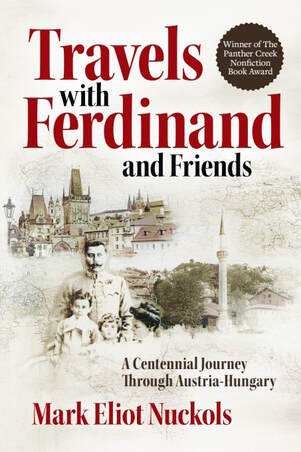Most important is the publication, in April, of my first book, Travels with Ferdinand! Related posts can be found here, here and here. The book may be purchased at Bookshop.org, Barnes & Noble or Amazon.
While I’ve kept busy as keyboardist in two churches, and have done much good from week to week at keeping things “humming,” I’ve not had as much time as I’d have liked for writing music. Still, I came up with two compositions this past year. One was a Psalm setting for the Prayers for Peace, called for by Pope Francis in October in light of recent violence around the world. Our congregation, at St. Peter the Apostle in Onley, VA, made its own impassioned plea. As part of that event, I was also asked to deliver a few facts on casualties, abductions, and forced internal or external migration from the conflict in Ukraine. Others spoke, in English and/or Spanish, on situations in Venezuela, Honduras, etc.
In November, I also wrote the words to a prayer, a reflection for the Feast of St. Cecilia, Patron of Musicians AND Thanksgiving. The two are very close, and sometimes coincide. I’ve had a particular devotion to Cecilia since singing in the St. Cecilia Choir at the Cathedral of St. Elizabeth (of Hungary) in Košice, Slovakia in 1996-97 and briefly in 2011.
Taking it slowly in the original German, I read All Quiet on the Western Front cover-to-cover, something I’ve wanted to do for years. Especially since taking my trip – the one that led to Travels with Ferdinand – examining the origins of the First World War. I also gave two talks on WWI, one on the war’s relation to the “Slavic question,” the other on representations of the conflict in lit and film.
I’ve read most of a memoir of a Russian-Israeli historian, published in the 1970s. A. N. Poletika was born in a small town in Ukraine and moved to Kyiv for secondary-school studies, where he witnessed the Kiev Pogrom of 1905 and was later well aware of the public commotion surrounding the Beylis Trial of 1913 and the acquittal of the defendant on charges of ritual murder. He also reflects on various pogroms that took place during the Russian Civil War, the umpteen different “governments” that ruled Kyiv during this time, as well as crimes again humanity committed by the Bolsheviks. He later got by as a correspondent for a Leningrad paper and had something of a career as an academic historian, though he was quite limited in what he could research or say. Never translated into English as far as I know, its Russian title is Videnoe i Perezhitoe (“Seen and Experienced”). It also contains little-discussed info about the Sarajevo assassination, one of Poletika’s chief topics of investigation.
And of course, I’ve read numerous books in English, among them Jonathan Haidt’s The Righteous Mind.
I have almost completed a large translation project involving 50 years worth of correspondence from my client’s Slovak grandmother to her daughter (client’s mother). It begins when the girl emigrated to the U.S. in 1921 at the age of 17 and ends at the grandmother’s death in 1971. I’ve done thirty years worth of the letters – another translator covered the 1930s and 1940s. My client is now looking for a publisher. The work has given me great insight into the effects of political and economic events on the daily lives of ordinary folk, as well as the “immigrant experience.”
Now for a really quirky one…
I’ve come to realize that bats are not really creepy, but actually cool. This came after a nighttime encounter with two of them in my bedroom. I learned to relax and trust their sonar when they fly around my head. Also realized that Strauss’ overture to Die Fledermaus (literally “the mouse”) is meant to suggest the fluttering motions of a bat’s wings, or the rhythm thereof. At least, the operetta will always be imbued with greater significance for me.
And now that 2023 has passed, it has also come to my attention that the year marked 250 years since the creation of the hymn "Amazing Grace." Despite that belated realization, I can say that I've played the song several times this past year at Masses and funerals.
And I’ve had lots of other realizations and, really, paradigm shifts. Too many to mention, too subtle to describe sometimes. Maybe I’ll get into more philosophical writing in 2024!

 RSS Feed
RSS Feed